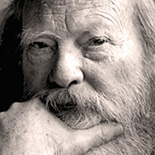 Hayden Carruth (August 3, 1921 – September 29, 2008) was an American poet and literary critic.
Hayden Carruth (August 3, 1921 – September 29, 2008) was an American poet and literary critic.
Carruth wrote more than 30 books of poetry, four books of literary criticism, essays, a novel and two poetry anthologies. He served as editor of Poetry magazine, as poetry editor of Harper’s, and as advisory editor of The Hudson Review 20 years. He was awarded a Bollingen Prize and Guggenheim and the NEA fellowships.
In 1992 he was awarded the National Book Critics Circle Award for his Collected Shorter Poems and in 1996 the National Book Award in poetry for his Scrambled Eggs and Whiskey. Shortly after the debut of Scrambled Eggs and Whiskey, he also won the $50,000 Lannan Literary Award. His later titles include the 2001 collection of poems Doctor Jazz and a 70-minute audio CD of him reading selections from Scrambled Eggs and Whiskey and Collected Shorter Poems. Other awards with which he was honored included the Carl Sandburg Award, the Lenore Marshall Poetry Prize, the Paterson Poetry Prize, the 1990 Ruth Lilly Poetry Prize, the Vermont Governor’s Medal and the Whiting Award.
Noted for the breadth of his linguistic and formal resources, influenced by jazz and the blues, Carruth’s poems are informed by his political radicalism and sense of cultural responsibility.
ASSIGNMENT
Hayden Carruth
“Then write,” she said. “By all means, if that’s
how you feel about it. Write poems.
Write about the recurved arcs of my breasts
joined in an angle at my nipples, how
the upper curve tilts toward the sky and the lower
reverses sharply back into my torso,
write about how my throat rises from the supple
hinge of my collarbones proudly so to speak
with the coin-sized hollow at the center, write
of the perfect arch of my jaw when I hold
my head back — these are the things in which I too
take delight — write how my skin is
fine like a cover of snow but warm and soft and
fitted to me perfectly, write the volupte
of soap frothing in my curling crotch-hair, write
the tight parabola of my vulva that resembles
a braided loop swung from a point,
write the two dapples of light on the backs
of my knees, write my ankles so neatly turning
in their sockets to deploy all the sweet
bones of my feet, write how when I am aroused
I sway like a cobra and make sounds
of sucking with my mouth and brush my nipples
with the tips of my left-hand fingers, and then
write how all this is continually pre-existing in my
thought and how I effect it in myself
by my will, which you are not permitted to understand.
Do this. Do it in pleasure and with
devotion, and don’t worry about time. I won’t
need what you’ve done until you finish.”
=======
THE COWS AT NIGHT
Hayden Carruth
The moon was like a full cup tonight,
too heavy, and sank in the mist
soon after dark, leaving for light
faint stars and the silver leaves
of milkweed beside the road,
gleaming before my car.
Yet I like driving at night
in summer and in Vermont:
the brown road through the mist
of mountain-dark, among farms
so quiet, and the roadside willows
opening out where I saw
the cows. Always a shock
to remember them there, those
great breathings close in the dark.
I stopped, and took my flashlight
to the pasture fence. They turned
to me where they lay, sad
and beautiful faces in the dark,
and I counted them—forty
near and far in the pasture,
turning to me, sad and beautiful
like girls very long ago
who were innocent, and sad
because they were innocent,
and beautiful because they were
sad. I switched off my light.
But I did not want to go,
not yet, nor knew what to do
if I should stay, for how
in that great darkness could I explain
anything, anything at all.
I stood by the fence. And then
very gently it began to rain.
=======
LETTER TO DENISE
Hayden Carruth
Remember when you put on that wig
From the grab bag and then looked at yourself
In the mirror and laughed, and we laughed together?
It was a transformation, glamorous flowing tresses.
Who knows if you might not have liked to wear
That wig permanently, but of course you
Wouldn’t. Remember when you told me how
You meditated, looking at a stone until
You knew the soul of the stone? Inwardly I
Scoffed, being the backwoods pragmatic Yankee
That I was, yet I knew what you meant. I
Called it love. No magic was needed. And we
Loved each other too, not in the way of
Romance but in the way of two poets loving
A stone, and the world that the stone signified.
Remember when we had that argument over
Pee and piss in your poem about the bear?
“Bears don’t pee, they piss,” I said. But you were
Adamant. “My bears pee.” And that was that.
Then you moved away, across the continent,
And sometimes for a year I didn’t see you.
We phoned and wrote, we kept in touch. And then
You moved again, much farther away, I don’t
Know where. No word from you now at all. But
I am faithful, my dear Denise. And I still
Love the stone, and, yes, I know its soul.